#something irrelevant
Text
seeing some prophecy discourse which has once again reminded me why i personally find the prospect of dany as the prince that was promised really compelling. and it makes the targaryens so much thematically richer. like, they only survived the doom through the power of prophecy and then the visions marked them forever and this thing, this blessing which gave generations of targaryens some existential meaning eventually morphed into a curse which brought so many of them great misery—"my brothers dreamed of dragons too, and the dreams killed them, every one." (aemon, affc) and in due course almost ended their line once again with rhaegar. but then dany happened.
almost four hundred years since the doom when prophecy saved them and nearly killed them again on the trident, dany was born. dany who carries echoes of all her targaryen ancestors within her. she's aegon the conqueror come again but she's also maegor the cruel when she promises the khals who had hurt her khalasar would die screaming. she's rhaenyra in her struggles to wield power and establish legitimacy as a woman, she shares her sense of egalitarianism with egg, and she drinks from the cup passed from rhaegar, i.e. inherits (what he once thought of) his narrative destiny to help defend the realms during the long night.
dany who is both their beginning, since she's the first targaryen created and introduced to us on page and the narrative end point of their dynasty. which reflects all the way into her arc being cyclical by design as it calls back to the foundation of the valyrian empire in essos—during the fifth war the freehold torched old ghis with dragonfire so nothing would grow there again and centuries later this girl, the last dragon, is going to help plant trees there again. it's not about retreading old ground or rejecting her house words but about redefining what it means to be the blood of the dragon. which is not to say all that came before her was meaningless since this recontextualisation is only possible through the three centuries of ancestral history weighing on her. and dany's very existence echoes back in time because the prophecy itself has influenced the lives of generations of targaryens. three hundred years of history, all the glory and the horror concentrated in this one person-point. the prince that was promised not simply as a figure of the long night but as someone who is the apotheosis of their house. dany as both their beginning and their end, because the iron throne is presently a symbol of stagnation, a world in stasis, and it has to go. no restoration, instead the old world dying in fire and a new world being born in the aftermath.
#linked that dragons planting trees post because i'm afraid someone will show up in the notes to say “dragons plant no trees” 💀#sorry to be a cringe prophecy poster but the themes and symbolism got to me.#and yeah i recall “r'hllor shows me only snow” i'm not saying it can't be jon in any capacity just that i find this thematically compelling#and this is not to say jon's irrelevant or that his targaryen heritage would mean nothing for his character#but in the five books so far the heart of his story are the free folk. the cup being passed from mance. and he does drink from it#the echoing all her ancestors thing happens to a lot of characters. archmaester rigney was onto something with his wheel of time reference#all the accomplished brandons through 8000 years of stark history. bran's namesakes. old nan sometimes confusing him with them.#which could mean nothing.#dany#daenerys targaryen#asoiaf#valyrianscrolls#*[🫀]#house targaryen
256 notes
·
View notes
Text
I have come to the annoying conclusion that many search engines are becoming super useless in trying to track down historical research without bending over backwards for answers. The amount of garbage that shows up in the results is so incredibly aggravating and has nothing to do with my search terms or questions. I cannot in fact "just use X search engines" apparently.
#history#culture#search engines#it's the most SIMPLE questions and yet I get nothing but sales sites and ai nonsense or real articles for something completely irrelevant#silly me trying to look up neat historical facts for world building purposes in things I wanna make#personal#personal ramblings
238 notes
·
View notes
Text
another redraw but it’s the scp yaoi I made when I was 11


#yes it was made in sony sketch#that era of my life was particularly horrible#also made something WAY worse and barely escaped getting groomed on scp amino becuz of it#shit was wild man#anyway here are the actual tags#scp#scp foundation#scp 049#scp 035#049 x 035#lgbtq#I lied one more irrelevant tag#besides being art progression I had a whole transition from fujoshi to himejoshi between these two pics#suggestive ?#dummmys doodles
167 notes
·
View notes
Text
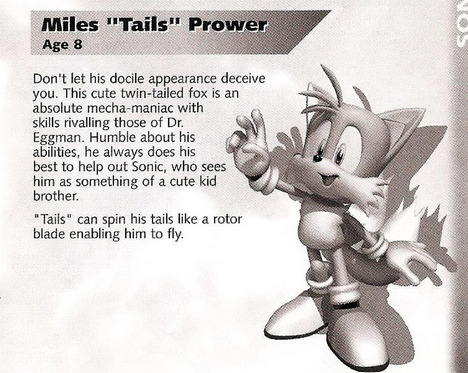
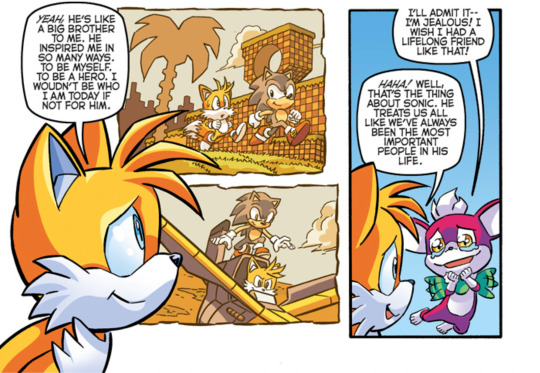
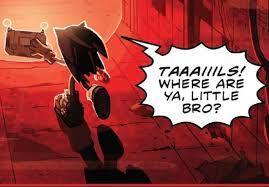
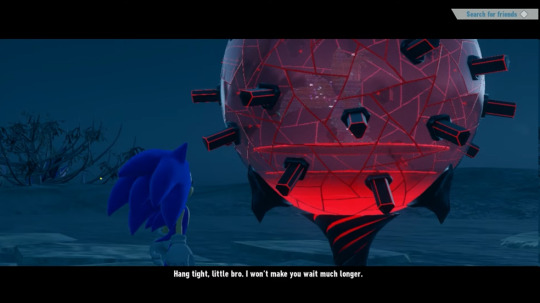
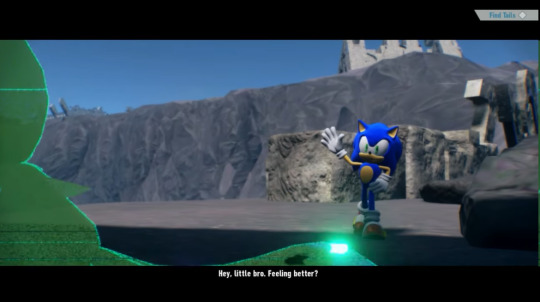
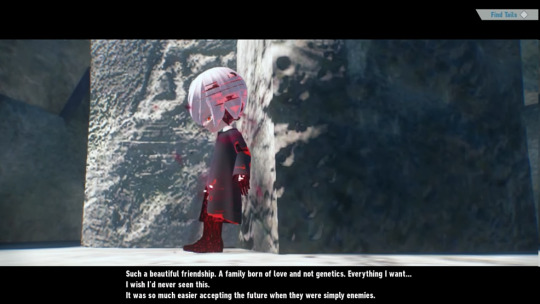
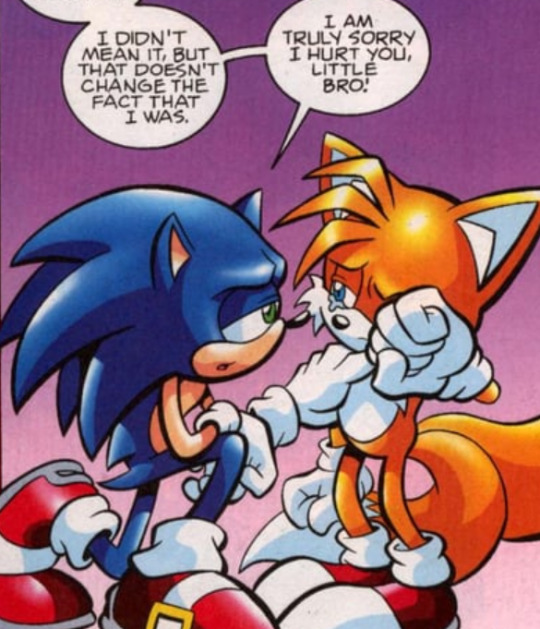
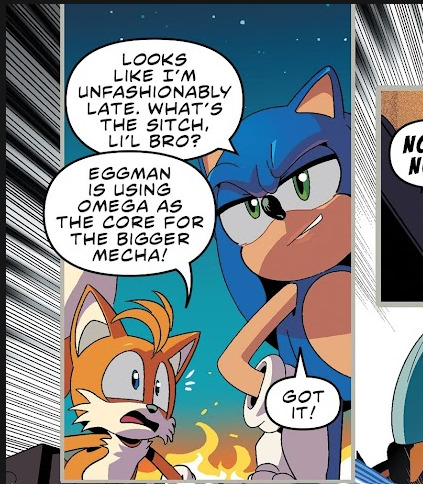


youtube
collection
#sorry i saw someone say sonic and tails dont see eachother as family at all again and it annoyed me#this isnt even all of the times theyve said it this is just a bunch of stuff i remembered off the top of my head#and also sonic has called tails little bro SO many times across different media that it would be impossible to track them all down#but i tried to include stuff from different media to show that this isnt a thing thats exclusive to one continuity or one period of time#because those are arguments i see people use to prove theyre not brothers#but even if it WAS something that is mentioned a lot in earlier sonic media and not so much in recent stuff.#not mentioning something as often anymore doesnt automatically make it non canon?? especially if theres no new info contradicting it#sonic frontiers spoilers#the sage picture probably looks irrelevant to people who havent played frontiers#but she was talking about sonic and tails there which is why i included it#also i put that aosth clip instead of screenshots from it because i didnt think a couple screenshots would do it justice#you really have to see the whole thing
872 notes
·
View notes
Text

i've been doing a s1 rewatch for research purposes and tell me why this is the first time i've noticed roy noticing isaac telling declan to stop looking at his phone during the first movie night. the choice to make isaac the next captain didn't just happen when he threw the chair at the tv in the finale. it was built up slowly as we got to learn about the boys. i'm so :')
#roy kent#isaac mcadoo#ted lasso#roy and isaac's relationship is something so special to me#bc like. with peace and love isaac was almost irrelevant when we first met him#and getting to see his growth into the man roy chose to make captain is something soooooo. to me. you know.
371 notes
·
View notes
Text
> people say a piece of media -isnt- influenced heavily by the author's personal life and biases
> reads about the life and biases of the author to confirm or deny this
> influence

#labz.txt#ITS ALLLLL INFLUENCE GIRLIE....#i dont nessecarily believe in the auteur but i do believe that like#saying a work is only what the audience makes of it is really reductive#and treating it like the author is just a conduit for the Great Well Of Human Creativity and didnt try to say something with it#or the work wasn't influenced by its production process in any way#kind of... makes no sense....#its like saying tommy wiseau is irrelevant to the reason the room is like that
148 notes
·
View notes
Text
Imagine deciding to make Helaena a dreamer to give her some “relevance”, but she ends up being even more irrelevant than she was in the book.
#They act as if her saying those prophesies actually means something. Literally nobody cares about what she says. She’s irrelevant af.#I would tag this as Helaena but it’s guaranteed to attract some rabid TG stans. Better to let them live in delusion#anti hotd#anti house of the dragon#team black#pro team black#canon asoiaf#asoiaf#asoiaf meta#fire and blood#anti team green
153 notes
·
View notes
Text
what i'm getting from the reactions to book 9.5 is that this is all of us right now
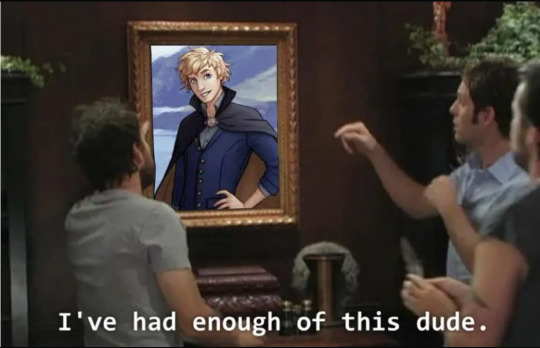
#and it's SO valid#at this point i think its crucial to our mental health that he is comedically irrelevant in book ten#where he's stuck in a hole and has to befriend a horse or something#kotlc#keeper of the lost cities
348 notes
·
View notes
Text
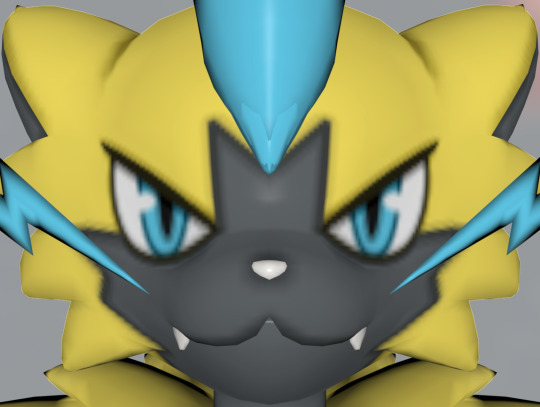
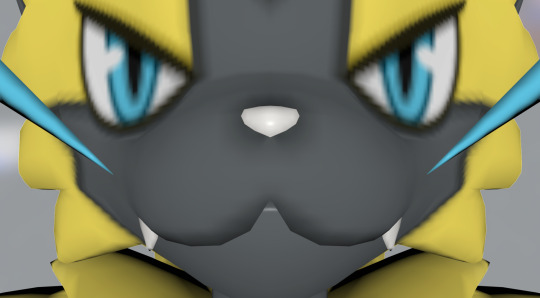
#slightly closer angle under the cut#zeraora#aaahhh yes. many a furry's Favorite Legendary#i'd have a hard time disagreeing! wait hold on one of the suggested tags when i typed “i'd” was “i'd cry”#me too hello? sorry WAIT WHAT WAS THAT ONE#when i was typing that one it had one with a bunch of. fire emojis in it. as a suggested tag. no idea what THAT was but#whatever this is irrelevant. yes many furries like this guy and i can see why. literal catboy pokémon. i definitely am not slightly miffed#that you can only get this thing through mystery gifts#literally the only zeraora i've ever acquired is the shiny one from the mystery gift they had in swsh#also i used to pronounce its name as [zə.'ɻaw.ɻə] instead of something like /ze.rə.'ɔ.rə/ or whatever people say#but nowadays i say the latter. just because everyone says that
179 notes
·
View notes
Text
One of the things about canon vs fanon Akashi that probably shocked me the most is the age he was when he lost his mother. I've seen almost everywhere that "he was a very young child", and I don't know, maybe it's just my definition of a young child being different, but I've always interpreted it as "around 5 years old", especially since we're talking here about someone who's 15-16 when the main plot is happening.
Seijuurou was in fifth grade when Shiori died (Chapter 266, Volume 30). That boy was around TEN OR ELEVEN when she died. At TWELVE he started Teikou. The trauma wasn't even probably healed. He lost his biggest and only support in the extreme domestic situation he was in and literally like 3 years later we have the GoM falling apart and him switching personalities. By Winter Cup, it was around five years after her death. On the other hand, he was only 15-16 at that time, so for him, it was a third of his life, but five years is still not a lot.
He probably remembers her very vividly, causing him even more pain. Also - he started switching personalities right after her death (also mentioned in the same chapter) and Midorima did acknowledge that sometimes Akashi seemed to be a different person, so the grand switch wasn't just "I'm going to lose" moment, it was going on since Shiori's death and it just cumulated and exploded then.
He wasn't a baby when Shiori died, he was a preteen, which was probably the worst moment in a person's life for losing someone you're that close with, because you're old enough to understand that they're gone forever, but young enough to not understand fully how the future might look like and how to cope with the lost.
If he was younger - he would probably forget most of his life with his mother there and it would only be some nice memories.
If he was older - he would probably be able to cope better with her passing. It sure would've been hard, but probably not that hard as it actually was.
He lost her in the worst possible moment, also almost right before starting a new school, right before starting to mature physically. With everything new suddenly appearing in his life, he was left alone, without the only person that seemed to have cared about him.
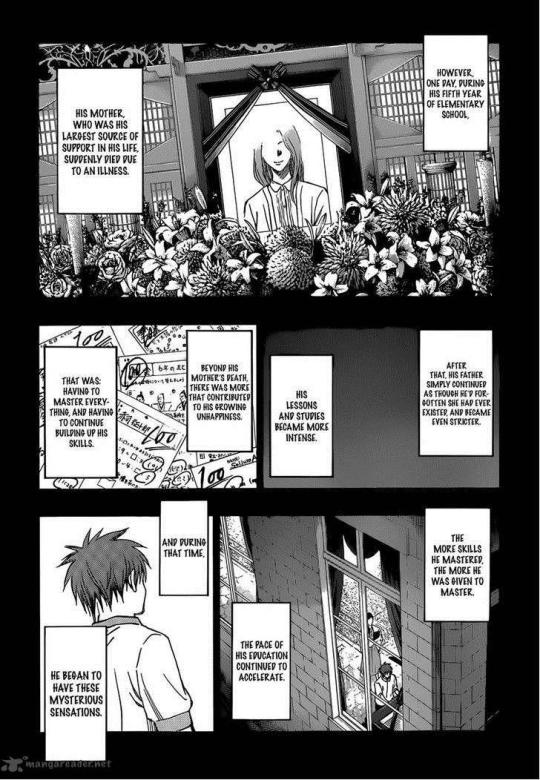

#i literally randomly once scrolled through his fandom wiki looking for something irrelevant#and i found out he was in 5th grade and i was shocked#is it only me that thought he was younger than that when Shiori died?#am i just stupid?#i pulled my mangas from the shelf just to found the pages when its mentioned#kuroko no basket#knb#kuroko's basketball#akashi seijuurou#akashi seijuro
179 notes
·
View notes
Text

current favorite seal
#cute#seal#pinniped#baby#Thanks for the submission nichtroshi#Friendly reminder please don't tag submissions as all possible tags#It just means I have to edit it and delete all the irrelevant tags if I post it#Otherwise this will come up if someone searches something unrelated#And I'd like visitors to be able to search certain species and have the correct photos come up if they do#Thanks! ^_^'#You'd be surprised how often I get asked about a certain seal and how helpful the tags have been#Kroshik and bootleg plush come up a lot...#(Not tagging the species on this one as I'm not 100% sure)
1K notes
·
View notes
Text
Thoughts on Geto Suguru's Psychology Pre-Defection
There's something that I've been meaning to talk about for a while now, and that is Geto's apparent tendency to conceal his negative impulses that allows for, in my view, faulty interpretations stating that he was faking his righteous beliefs all along just because assuming high moral ground gave him a sense of superiority and fed his ego. Meanwhile I would argue that, on contrary, this habit is more indicative of Geto's insecurities and heightened sense of self-awareness.
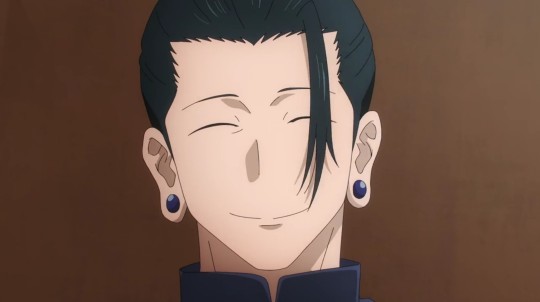
My thoughts on this underneath the cut, but beware: it's going to be long!
To begin with, I think there are two major factors playing into the misconception that I mentioned. The first one boils down to prejudice forcing people to look upon younger Geto through the lense of a person he would go on to become. The kind of cautious logic that says that a deeply empathetic, caring highschooler couldn't have turned into a murderous cult leader preaching the merits of genocide, and thus seeks ways to dehumanize him from the very beginning (because that's a terrible concept to wrap your mind around, I agree). And the second factor being... well, that Suguru's behaviour really does come off as fake at times.
We experience 'negative' emotions as naturally as 'positive' ones, and despite some of them are conventionally accepted as 'good' whereas others are painted as 'bad', no emotion is inherently harmful or invalid; they all are a part of what makes us human. While it's undoubtedly a chilly and ominous concept for someone to be completely devoid of any positive traits, just as unnatural it is to display positive responses only. Perfection is stored away at museums, no living breathing human being can go through their life without being affected by negative impulses or thinking. But more often than not negative emotions are condemned and stigmatized (in the end, we still refer to them as 'negative'), and self-consciousness can make one ashamed or guilty of experiencing them. The end result of this would be trying to hide your feelings under one more appealing appearance, creating a warp between what's intuitive and what's manifest, an inadequate emotional response.
Gojo (at least in his teenage years) is widely outspoken and doesn't hesitate to outwardly express himself, whether verbally or via body language. It probably takes root in Gojo's upbringing: he was spoilt rotten, revered for being born with a silver spoon in his mouth, his every whim indulged and tended to. There simply wasn't any need for him to try and make a good impression by faking docility and emotions that are more pleasant and easier to digest. Gojo may be boisterous and bratty and obnoxious, but he isn't trying to 'trick' anyone into thinking he's better than he really is, and this paints a more sincere, believable picture to the audience.
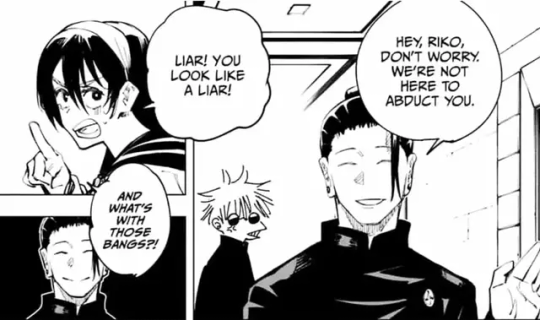
On the other hand, Geto's emotions, partly due to his more solemn demeanour, are often toned down or consciously concealed. For instance, when Riko manages to strike a nerve in him, his response is to immediately plaster on mawkish 'customer service' smile to not give away his annoyance. This scene is especially interesting to me because of how Amanai's reaction gives voice to the audience's concerns. Referring to Suguru, she says, 'You look like a liar!' -- and by doing so calls him out on his tendency to mask negative emotions. Intuitively, she can still read his feelings in his body language, in the delay in his expression rearranging itself into a smile, and so can the viewer. We know he's annoyed, and his words about having no intention to harm Riko don't exactly align with how he behaves (even if in a playful manner) a moment after saying them. It creates a tangible contradiction between what he says his intentions are and what his actions speak of, between the appearances and what lies behind them. And this contradiction raises suspicion, in a way that if somebody's making an effort to hide something, then there must be something to hide.
In retrospect this doubt might seem reinforced and justified. I see how it's easy to fall into thinking that Geto, having become a criminal who's done unspeakably cruel things and who backs up his delusional ideals with bigoted reasoning, should've been hiding darker parts of himself behind all those fake smiles and talks about righteousness. But pinning the blame on Geto alone by claiming that he had violent tendencies to begin with is essentially disregarding systematic issues that the story strives so much to convey to the audience. Holding innate individual qualities accountable for the catastrophe is basically the sort of thinking that the higher-ups display, whose main strategy for dealing with problems is public scapegoating and disposing of every single threat to the current order by giving out one death sentence after the other. I don't think we as the viewers are supposed to reach the conclusion that Suguru is at fault for what happened, which is not to say he's faultless, nonetheless the narrative goes to great lengths to make us sympathize with him, not the other way around.
Now, there's really a handful of ways in which Geto's character seems to contradict himself. He shares overspilling empathy for the people around him, that is his character's core trait, but that very empathy spells out his downfall when it degrades into resentment and hate. He displays a largely considerate and sympathetic demeanour, but he's first introduced to the audience as someone who backhandedly bad-mouths Utahime for being weak. He's one half of the strongest duo, but whereas Gojo is a natural-born genius, Geto evidently struggles with his powers. His entire career as a curse user is based on the mentality which justifies the means to an end, but reaching the end goal is impossible for him as he is, Geto himself as much as admits to it during his last conversation with Satoru. He sets on his wild-goose chase for power, but ends up stagnating to the point where his use of Curse Manipulation in the Hidden Inventory Arc is much more inventive and creative than in Jujutsu Kaisen 0. The list goes on, but you got the gist.
To live for the purpose of being yourself. And for that goal, Geto could only continue to pursue his twisted dream, drowning himself in a curse that lies in the gap between ideal and reality.
I believe this to be such a poignant phrase when it comes to Geto's characterization because of how well, in my view, it encapsulates the conflict of his character -- or, if you will, the contradiction of it. It succinctly expresses his outlook on things, where he views the world how it's ideally supposed to be rather than how it realistically is. I've actually somewhat already elaborated on this in my very first rambling on here:
To me, Geto seems to be a type of person who needs something to guide him, some clear-cut ideal to make it possible for him to navigate through his life. He is pedantic in that sense: the sharp outlines of his views define his surroundings, the very way he looks at things and perceives them. He needs everything to fall precisely in line with his own set of ideals, which seems to be quite verified and well-adjusted within his mind, like a strict and refined concept he constructed for himself, like a routine he's used to following out of pure principal. His own belief system being so defined, it's that which makes him indulge in excessive discourse on the subject of morality and responsibility, like he's patiently laying out the basics in front of a disobedient child to help them wrap their mind around some fundamental truth that is so obvious and natural for him.
In a way, Geto concealing his negative emotions is not a false front put up against scrutinizing looks that could reveal his 'true nature'. Quite the opposite, I think it speaks more of his well-meaning intentions. When trying to change the way things are, start at yourself, and I guess this is the principle Geto's trying to apply here. By following through his own ideal, Geto does his best to be an upright person he believes himself obliged to be, whether that means forcing himself to absorb curses or putting on a customary smile. It might be juvenile and wishful thinking on his part, probably akin to 'fake it till you make it', but it's important to keep in mind that at that time he was still but a teenager. Moreover, he was put on par with somebody as praised within jujutsu society as Gojo, he must've felt on top of the world, too entranced by their warm spring of youth to care too much about the occasional slips. With Satoru by his side, I imagine Geto could afford to cut some slack and participate in the mischief. Later we see post-defection Geto drop his frivolous facade only when he's entirely alone -- another hint at how Gojo was really the only person Suguru allowed himself to confide in, that is untill the SPVI put uncrossable distance between them.
While I do say that Geto's intentions are well-meaning, the way he positions himself actually reveals some quite problematic aspects of his mindset. Namely, his attitude towards non-sorcerers, whom he clearly sets into a different category from himself and his fellow sorcerers. Regular people lack crucial understanding, they are weak because they are helpless, therefore they have to be shielded from the source of harm. This is a largely patronizing concept of empathy, since it's based on the notion that the 'weak' are inherently inferior to Geto himself and others involved in jujutsu society. It's interesting how it's reflected in Geto's insistence on the necessity of curtains. The use of curtains furthers the extent of non-sorcerers' ignorance, they never learn how to stay out of harm's way as they are deprived even of as much as their perception of the existing danger. It reminds me of how a parent would brush a child's concerns aside because they're too young and naive and do not need to be aware of adult life's hardships. Just like Geto's paternalistic outlook, it does not come from malice or negligence, it's just an attempt to keep someone less experienced and skilled safe. Nonetheless it's harmful as it puts that person in a position which denies them agency.
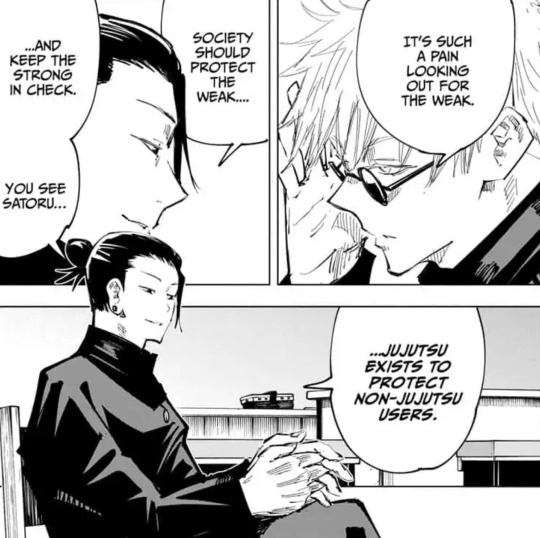
In my view, Suguru's fake smiles are an extension of his acute sense of responsibility. In front of those over whom he assumes responsibility, he presents himself as calm, collected and dependable as if it's supposed to reassure them. It's his job to protect them and make them feel safe, so there's no need showing them his own struggle. Even if such thinking is condescending, it's not in any way malicious. Geto's entire character arc would be simply non-existent if he wasn't completely genuine in his sentiments.
So why do I talk about Geto's insecurities when first introducing the topic of this post? Well, I'm about to take a deep dive into the field of speculation and theories and finally get to the point why I'm writing all this in the first place (took me long enough, lmao). There's also a reason why I brought up Gojo's upbringing when talking about his personality and how it contrasts Geto's. You see, like Satoru's way of dealing with his emotions can be linked to his childhood experience, Suguru's behaviour might also give us some clues about the circumstances he grew up in.
The more I look into it, the more convinced I become that Geto was in one way or another exposed to emotional trauma in his childhood. Remember when I mentioned inadequate emotional responses? While being one, smiling in reaction to stress may act as a defense mechanism of sorts, shielding the person from the chronic nature of the unpleasant experience. It also may serve as a way to avoid alienation by others who are not privy to the source of your distress or are not comfortable with it. Affiliative smiles are motivated by social factors, it's a tool used to create and maintain social connections. Human beings are hardwired to connect with others, feeling alienated by the people around us causes us great pain.
The thing us, we must assume that Geto is relatively new to the jujutsu world in the flashback arc. Given his non-sorcerer background, chances are he was the only one in his immediate surroundings with the ability to see and exterminate curses. There couldn't have been a way for him to confide in someone with his concerns and fears born from interacting with something only he could see. So I assume that eventually that resulted in Suguru developing an unhealthy habit of masking his emotions before the ones he cared about. And as over time he grew more aware of his abilities and got a grasp on how his CT works, I imagine Geto committed to exorcising curses in order to protect ordinary people from them -- all by himself. This, in turn, must have solidified that conception in Suguru's head which ultimately othered him from the people around him and put them in a position inferior to him since they were the ones depending on him and his powers.
As Geto should've mostly kept to himself, I also see how he might have grown heavily reliant on his analytical mind. Overthinking is a habit developed early on in life as a way to wade through feeling uncertain or unsafe. It's an attempt to make sense of confusing reality by applying an analytical lense to it and compartmentalizing it into neat, easily understandable categories. And also a way to regain sense of self when you find yourself in a situation you otherwhise have little to no control over. And while over-analyzing can create a sense of security, it may also interfere with a person's emotional responses. I guess it's something that could be applied to Geto, too, because for such a self-reflective character he always struck me as someone with oddly little regard of his own feelings.
As a side note, I like how Geto's tendency to over-analyze things is shown in that one scene when Yaga's briefing him and Gojo on the upcoming mission. Suguru's clearly presented as someone who's very mindful of how the world around him works. Understanding helps him assign meaning to different aspects of life, and he relies upon it heavily. Also, as someone who's been uprooted from his former society and introduced instead to an entirely different world, I guess it's important for Geto to fit in. Him being highly knowledgeable about such essential details is, in my view, indicative of such effort on his part. Whereas Satoru simply does not care about such details, the reality makes sense to him as it is as he was born perfectly fit into it.
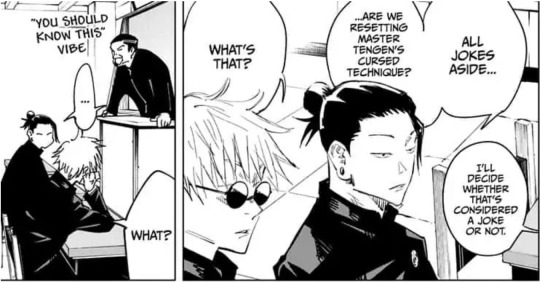
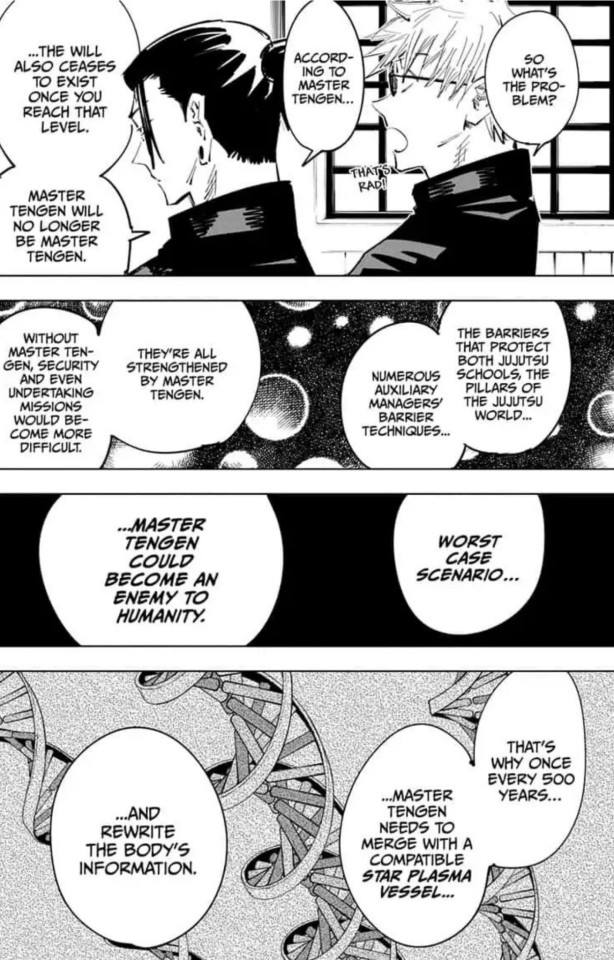
Last but not least, Geto's infamously guilty of a dichotomous, or black-and-white, outlook on things. This is the all-or-nothing mentality that leaves little to no room for nuance and does not allow two opposite statements to be true at once. It's a common cognitive distortion that manifests immature thought; a rigid mindset more often than not bordering on extreme. Meanwhile the very foundation of Geto's downfall is the inability to adapt to the complicated reality which doesn't align perfectly with his idealistic vision. He ultimately failed to wrap his head around the world with grey areas, his black-and-white thinking thinking prevented him from doing so.
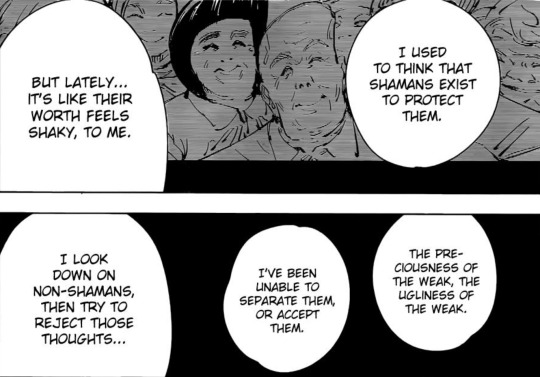
The development of such maladaptive personality traits has been repeatedly linked to the effects of childhood trauma. If the environment which a person grew up in was traumatic and chaotic, black-and-white thinking might have given them a sense of control through rationalization. That's why a mentality which doesn't allow for nuance and doesn't reflect life in its intricate complexity comes off as childishly simplistic. Seeing the world in all-or-nothing terms in some way means reverting to your inner child. And this is actually something that Shoko accuses Geto of during their brief conversation in Shinjuku. In his thinking Geto doesn't grow past his traumatic experience, whether it was his parents actively abusing his abilities for their own gain or the ache of being alienated at such an early age.
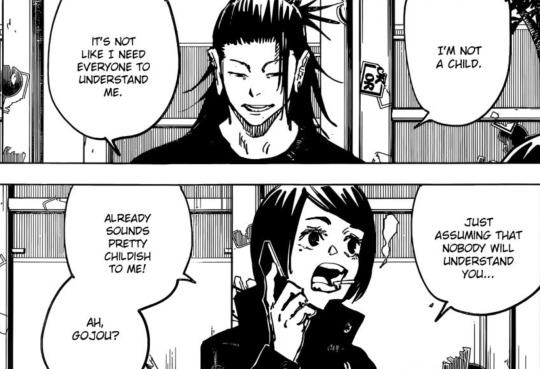
If the nature of Geto's relationship with his parents was abusive, it would also explain his altruism. Suguru goes out of his way to express his concern for well-being of those around him, and he does genuinely care, but all the while it could be a way for him to tend to his own unsatisfied needs by helping others. He seems to be highly attuned to others through his empathy, but also somewhat has trouble advocating for himself, resulting in harmful patterns of self-sacrifice or self-neglect.
It's true, there is a lot of contradictions housed within Geto's character, which are evident in his mindset and his actions. But I don't believe this to be due to sloppy writing, on contrary -- it's the kind of writing that speaks through detail and nuance and invites the reader to ponder why is this or that character the way they are.
#jjk#jujutsu kaisen#jjk analysis#jjk meta#geto suguru#gojo satoru#might as well tag him#i'm so sorry it's way too long for something so irrelevent considering all the recent events#and it probably needs proper structuring#i guess i'll edit it some time eventually#maybe
386 notes
·
View notes
Text
School is starting on Monday, so I'll be online less
Here have this doodle

Xoxo bye
#napoleonic era#napoleon#auguste de marmont#napoleonic wars#napoleon bonaparte#marmont#auguste marmont#history memes#marmont shitposting#digital drawing#digital illustration#artist on tumblr#i shall emerge every couple of months or weeks to post an irrelevant meme about my favorite hairy bastard#also tried something new with this drawing :3
78 notes
·
View notes
Text
making inquisitors always requires like at least 5 backstory supporting cast members
#beatrice already has a father a dead mother at least two half-siblings a gay aunt and an slightly evil uncle at LEAST#actually i wont kill off the mother bc im a feminist. she faked that suicide and is now a lord of fortune or something#this is irrelevant to bea’s story bc she would have no idea. unless at some point i want the mother to show up for terribleness#insert obligatory bea’s-mother-as-rook joke
65 notes
·
View notes
Text
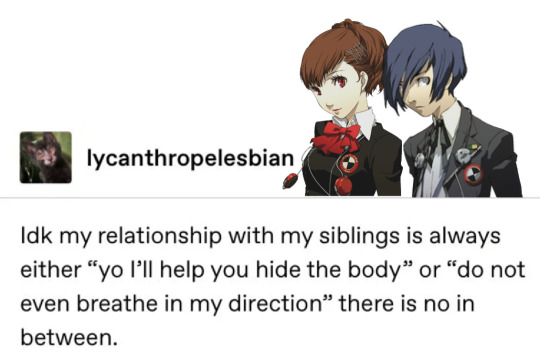
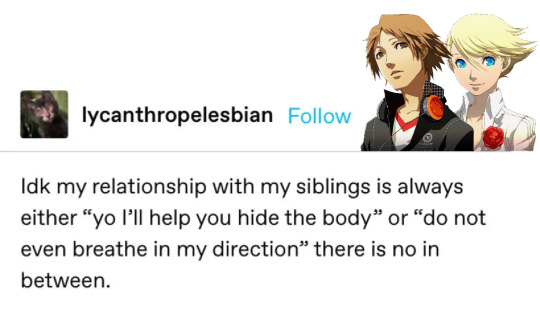
i made the p3 protags version of this like last month but i realized like five minutes ago it fits the hanamura bros too so. yea.
#persona#persona 3#p3#persona 4#p4#makoto yuki#minato arisato#kotone shiomi#minako arisato#yosuke hanamura#teddie#teddie persona 4#teddie hanamura#worst possible combination of characters for tagging purposes. two protagonists and teddie-#irrelevant side note related to that but teddie hanamura being a semi-popular tag makes me happy inside. the most siblings ever#anyways something something cain instinct
103 notes
·
View notes
Text
Wild how we know that Elizabeth Woodville was officially appointed to royal councils in her own right during her husband’s reign and fortified the Tower of London in preparation of a siege while 8-months pregnant and had forces gathering at Westminster “in the queen’s name” in 1483 – only for NONE of these things to be even included, let alone explored, in the vast majority of scholarship and historical novels involving her.
#lol I don't remember writing this - I found it when I was searching for something else in my drafts. But it's 100% true so I had to post it.#elizabeth woodville#my post#Imo this is mainly because Elizabeth's negative historiography has always involved both vilification and diminishment in equal measure.#and because her brand of vilification (femme fatale; intriguer) suggests more indirect/“feminine” than legitimate/forceful types of power#It's still bizarre though-you'd think these would be some of the most famous & defining aspects of Elizabeth's life. But apparently not#I guess she only matters when it comes to marrying Edward and Promoting Her Family and scheming against Richard#There is very lacking interest in her beyond those things even in her traditionally negative depictions#And most of her “reassessments” tend to do diminish her so badly she's rendered utterly irrelevant and almost pathetic by the end of it#Even when some of these things *are* mentioned they're never truly emphasized as they should be.#See: her formal appointment in royal councils. It was highly unconventional + entirely unprecedented for queens in the 14th & 15th century#You'd think this would be incredibly important and highlighted when analyzing late medieval queenship in England but apparently not#Historians are more willing to straight-up INVENT positions & roles for so many other late medieval queens/king's mothers that didn't exist#(not getting into this right now it's too long...)#But somehow acknowledging and discussing Elizabeth's ACTUAL formally appointed role is too much for them I guess#She's either subsumed into the general vilification of her family (never mind that they were known as 'the queen's kin' to actual#contemporaries; they were defined by HER not the other way around) or she's rendered utterly insignificant by historians. Often both.#But at the end of the day her individual role and identity often overlooked or downplayed in both scenarios#and ofc I've said this before but - there has literally never been a proper reassessment of Elizabeth's role in 1483-85 TILL DATE#despite the fact that it's such a sensational and well-known time period in medieval England#This isn't even a Wars of the Roses thing. Both Margaret of Anjou and Margaret Beaufort have had multiple different reassessments#of their roles and positions during their respective crises/upheavals by now;#There is simply a distinct lack of interest in reassessing Elizabeth in a similar way and I think this needs to be acknowledged.#Speaking of which - there's also a persistent habit of analyzing her through the context of Margaret of Anjou or Elizabeth of York#(either as a parallel or a foil) rather than as a historical figure in HER OWN RIGHT#that's also too long to get into I just wanted to point it out because I hate it and I think it's utterly senseless#I've so much to say about how all of this affects her portrayal in historical fiction as well but that's going into a whole other tangent#anyway- I am forever judging historical/fictional books that center around or heavily involve Elizabeth which do not highlight these things#ofc there are other things but these in particular *really* frustrate me#just felt like ranting a bit in the tags because these are all things that I want to individually discuss someday with proper posts...
76 notes
·
View notes